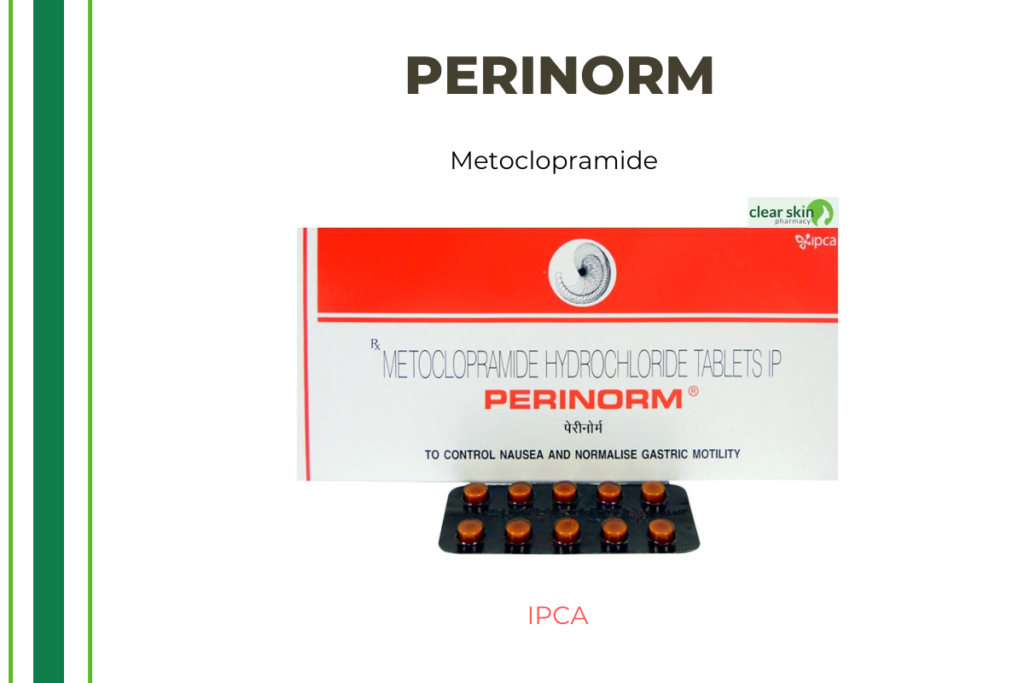Perinorm
Anti-emetics, which include Perinorm, are used to alleviate nausea and vomiting caused by chemotherapy, radiation therapy, and migraine. Perinorm is also used to treat gastroesophageal reflux disease and delayed stomach emptying in people with GERD (GERD). Vomiting is an involuntary response in which the stomach’s contents are expelled by the mouth, whereas nausea is an unpleasant sensation in which the individual desires to vomit. Regular reflux of stomach acid into the esophagus is referred to as gastroesophageal reflux disease (GERD) (oesophagus).
Perinorm includes metoclopramide, which increases the motility of the upper gastrointestinal system, allowing food to flow more rapidly and lowering the symptoms of GERD and gastric emptying. Additionally, it reduces nausea and vomiting by affecting the region of the brain that controls vomiting.
Take Perinorm 30 minutes prior to eating, preferably before bedtime. Perinorm pills should be swallowed whole with a full glass of water; it is not suggested to chew or split the tablets. The liquid formulation of Perinorm should be taken orally using the measuring cup supplied in the package; before each use, the bottle should be thoroughly shaken. The injectable form of Perinorm Tablet 10 must be delivered by a medical practitioner; self-administration is not permitted. Depending on the severity of your medical condition, you should take Perinorm for as long as your physician prescribes. This medicine may cause diarrhea, fatigue, weakness, restlessness, low blood pressure, rigidity, tremor, uncontrollable muscular movements, muscle stiffness, and depression. The majority of these side effects do not require medical intervention and will disappear with time. However, if you have these side effects frequently, you should visit your physician.
Inform your doctor if you have heart problems, abnormal salt levels, brain issues, atopy, porphyria, liver or kidney problems prior to using Perinorm. Perinorm should not be used for more than three months, as it may increase the risk of muscle spasms. Before using Perinorm if you are pregnant or want to become pregnant, see your doctor. Avoid using Perinorm if you are a breastfeeding mother since it can pass into breast milk and damage your child. Perinorm can cause drowsiness or vertigo, so only drive if you are alert. Perinorm should not be administered to children since its safety has not been established. Alcohol should not be used while using Perinorm, since it might induce sleepiness and vertigo.
Perinorm is used to treat nausea, vomiting, gastroesophageal reflux disease (GERD), and stomach emptying.

Medicinal Advantages
Anti-emetics, which include Perinorm, are used to alleviate nausea and vomiting caused by chemotherapy, radiation therapy, and migraine. Perinorm is also used to treat gastroesophageal reflux disease and delayed stomach emptying in people with GERD (GERD). Perinorm includes metoclopramide, which improves the motility of the upper gastrointestinal tract, letting food to flow more rapidly and decreasing sensations of nausea. It also reduces nausea and vomiting by acting on dopamine receptors in the brain and gastrointestinal tract. Perinorm is also used to treat unresponsive gastroesophageal reflux disease (GERD) to traditional treatments. Metoclopramide may also aid diabetics with difficulty emptying their stomachs. Metoclopramide is used to alleviate nausea and vomiting induced by cancer therapy, to facilitate small bowel intubation, and to speed up bowel emptying before to radiographic examination of the stomach.
Use Instructions
Metoclopramide should be taken 30 minutes before to meals, preferably at night. Metoclopramide is administered as a tablet and should be swallowed with a full glass of water; the pill should not be chewed or broken. Metoclopramide in liquid form should be administered orally using the measuring cup supplied in the box; the bottle should be well shaken before each use. Metoclopramide Tablet 10’s injectable formulation must be given by a healthcare professional; do not self-administer. Your physician will select the duration of Metoclopramide treatment based on your medical condition.
Storage
Place in a cool, dry area out of direct sunlight.
Metoclopramide Side Effects
Similar to other medications, metoclopramide can have side effects, though not everyone has them. The side effects of Metoclopramide Tablet 10 include diarrhea, fatigue, weakness, agitation, low blood pressure, rigidity, tremor, involuntary muscle movements, muscle stiffness, and depression. Consult your doctor if you experience any of these side effects on a regular basis.
Drug Recommendations
Do not use Metoclopramide if you have stomach bleeding or obstruction, involuntary muscle spasms, epilepsy, Parkinson’s disease, or methaemoglobinemia; if you are taking levodopa; or if you have had gastrointestinal surgery within the past 3-4 days. Consult your physician before to using Metoclopramide if you have heart problems, abnormal salt levels, brain issues, atopy, porphyria, liver or kidney problems. Metoclopramide should not be used for more than three months, as it may increase the risk of muscle spasms. Before using Metoclopramide if you are pregnant or planning to become pregnant, you should consult with your doctor. If you are breastfeeding, you should not use Metoclopramide since it can enter breast milk and damage your child. Because metoclopramide may provoke drowsiness and vertigo, you should only operate a vehicle if you are fully alert. Metoclopramide should not be provided to children since its safety has not been established. Avoid alcohol when using Metoclopramide, as it may induce drowsiness and vertigo.
Interactions Between Drugs
Aspirin, morphine, acetaminophen, hydrocodone, tramadol, antidepressants (duloxetine, citalopram, sertraline, fluoxetine, paroxetine), antihistamines (diphenhydramine), antiemetic (cyclizine, promethazine), antibiotics (ciprofloxacin), anti-anxiety drugs (diazepam, alprazolam), and antih (digoxin).
There have been no food-drug interactions found or documented.
Metoclopramide may interact with gastrointestinal issues, depression, seizures, fluid retention, high blood pressure, parkinsonism, pheochromocytoma (tumor of the adrenal gland), Neuroleptic malignant syndrome (nervous disorder characterized by high fever and muscle stiffness), Tardive dyskinesia (jerky, rigid facial movements), and kidney dysfunction.
Cautionary Note
ALCOHOL
Avoid consuming alcohol while using Metoclopramide, since it may induce dizziness and drowsiness.
PREGNANCY
Discuss Metoclopramide with your doctor if you are pregnant; your doctor will only prescribe it if the benefits exceed the risks.
BREAST FEEDING
If you are breastfeeding, you should not use Metoclopramide since it can enter breast milk and damage your child.
DRIVING
Metoclopramide may cause drowsiness, dizziness, and uncontrolled movements. If you are not awake, you should not drive or operate heavy machinery.
LIVER
It is conceivable that you will require a dose adjustment. Before using Metoclopramide, consult your doctor if you have a liver issue or any other concerns.
KIDNEY
It is conceivable that you will require a dose adjustment. Consult your physician before using Metoclopramide if you have renal issues or any other concerns.
No habit formation
Advice on Diet and Lifestyle
More often smaller meals should be taken.
Stay hydrated by consuming copious amounts of water. Oral rehydration solutions replace lost electrolytes (ORS).
Avoid eating solid foods until vomiting has ceased.
Avoid eating anything that may upset your stomach.
Get as much rest as you can. After eating, you should not do anything.
Bread and cookies are examples of simple, light meals that should be consumed.
Strong-flavored meals and fried foods should be avoided.
Ginger tea might aid with digestion.
Recommendations
Your physician may recommend that you undergo routine blood tests to evaluate your blood pigment levels. Metoclopramide treatment should be terminated immediately and permanently if methaemoglobinemia is diagnosed. Methaemoglobinaemia is a blood condition in which the hemoglobin iron is oxidized and unable to reversibly bind to oxygen.
Other details : This item is non-refundable.
Glossary of Diseases and Conditions
Vomiting is an involuntary response in which the stomach’s contents are expelled by the mouth, whereas nausea is an unpleasant sensation in which the individual desires to vomit. Nausea and vomiting can occur alone or together. Frequent causes include motion sickness, emotional stress, indigestion, food poisoning, a high body temperature, and overeating. Some therapies, such as chemotherapy and radiation, may cause nausea and/or vomiting as a side effect. Controlling nausea and vomiting is essential for cancer patients to do daily duties. Untreated, it can induce mental abnormalities, loss of appetite, malnutrition, and dehydration.
GERD: Gastroesophageal reflux disease A coating of mucus shields the stomach from acid. Excessive acid production can result in the dissolution of the mucosal layer, leading to conditions such as GERD, acidity, and peptic ulcers. Regular reflux of stomach acid into the esophagus is referred to as gastroesophageal reflux disease (GERD) (oesophagus). Backflow (acid reflux) irritates the food pipe, resulting in heartburn.
When the stomach takes too long to empty its contents into the intestine, gastric emptying occurs. This may result in nausea, vomiting, and gastrointestinal distress.
FAQs
Metoclopramide includes the active ingredient metoclopramide, which increases the motility of the upper gastrointestinal tract, allowing food to move more rapidly and lowering the symptoms of GERD and gastric emptying. Additionally, it reduces nausea and vomiting by affecting the region of the brain that controls vomiting.
Metoclopramide should only be used for as long as prescribed by a physician. Metoclopramide should not be used for more than three months, as it may increase the risk of muscle spasms.
Metoclopramide may cause dizziness, drowsiness, and involuntary muscle movements. If you feel dizzy or drowsy, do not drive or operate heavy machinery until you feel aware again.
As a side effect, Metoclopramide Tablet 10 may induce diarrhea. If you have diarrhea, consume plenty of liquids and fiber-rich meals. Consult a physician if you experience severe diarrhea or discover blood in your feces.
Metoclopramide, particularly when taken intravenously, may cause a reduction in blood pressure. To avoid unpleasant side effects, monitor your blood pressure closely while using Metoclopramide.
Each dose should be administered at least 6 hours apart. To prevent an overdose, do not take a second dosage of Metoclopramide, even if you vomit or refuse it.
Possible adverse effects of metoclopramide include trembling, tics, twisting movements, muscle stiffness, and rigidity. If you are experiencing any symptoms, get medical attention immediately.






Be the first to review “PERINORM 10 Tablets”